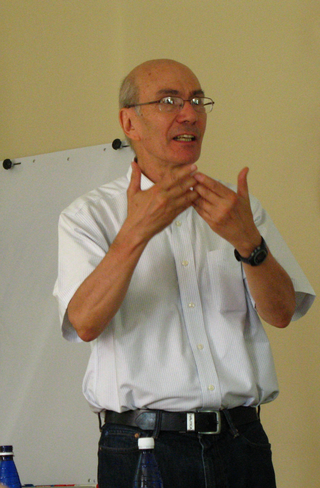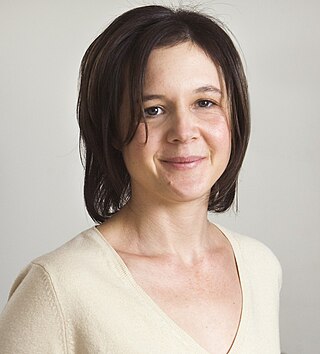In philosophy and neuroscience, neuroethics is the study of both the ethics of neuroscience and the neuroscience of ethics. The ethics of neuroscience concerns the ethical, legal and social impact of neuroscience, including the ways in which neurotechnology can be used to predict or alter human behavior and "the implications of our mechanistic understanding of brain function for society... integrating neuroscientific knowledge with ethical and social thought".
Sandra G. Harding is an American philosopher of feminist and postcolonial theory, epistemology, research methodology, and philosophy of science. She directed the UCLA Center for the Study of Women from 1996 to 2000, and co-edited Signs: Journal of Women in Culture and Society from 2000 to 2005. She is currently a Distinguished Professor Emeritus of Education and Gender Studies at UCLA and a Distinguished Affiliate Professor of Philosophy at Michigan State University. In 2013 she was awarded the John Desmond Bernal Prize by the Society for the Social Studies of Science (4S).

Stephen P. Stich is an American academic who is Distinguished Professor of Philosophy and Cognitive Science at Rutgers University, as well as an Honorary Professor in Philosophy at the University of Sheffield. Stich's main philosophical interests are in the philosophy of mind, epistemology, and moral psychology. His 1983 book, From Folk Psychology to Cognitive Science: The Case Against Belief, received much attention as he argued for a form of eliminative materialism about the mind. He changed his mind, in later years, as indicated in his 1996 book Deconstructing the Mind.
Women have made significant contributions to philosophy throughout the history of the discipline. Ancient examples include Maitreyi, Gargi Vachaknavi, Hipparchia of Maroneia and Arete of Cyrene. Some women philosophers were accepted during the medieval and modern eras, but none became part of the Western canon until the 20th and 21st century, when some sources indicate that Susanne Langer, G.E.M. Anscombe, Hannah Arendt and Simone de Beauvoir entered the canon.
Heidi M. Ravven is the Bates and Benjamin Professor of Classical and Religious Studies at Hamilton College, where she has taught her specialization, Jewish Philosophy, and general Jewish Studies since 1983. She is a Fellow in Neurophilosophy of the Integrative Neurosciences Research Program, which is co-directed by Vilayanur Ramachandran and Kjell Fuxe. She has been appointed Visiting Professor of Philosophy in the School of Marxism at Northeast Normal University, Changchun, China, for 2017-20.

Cordelia Fine is a Canadian-born British philosopher of science, psychologist, and writer. She is a full professor in the History and Philosophy of Science programme at the University of Melbourne, Australia. Fine has written three popular science books on the topics of social cognition, neuroscience, and the popular myths of sex differences. Her latest book, Testosterone Rex, won the Royal Society Science Book Prize, 2017. She has authored several academic book chapters and numerous academic publications. Fine is also noted for coining the term 'neurosexism'.

Alice Crary is an American philosopher who currently holds the positions of University Distinguished Professor at the Graduate Faculty, The New School for Social Research in New York City and Visiting Fellow at Regent's Park College, University of Oxford, U.K..
Marilyn Ann Friedman is an American philosopher. She holds the W. Alton Jones Chair of Philosophy at Vanderbilt University.
Valerie G. Hardcastle is a professor of Philosophy and Psychology at The University of Cincinnati who grew up in Houston, Texas.
Patricia W. Kitcher is the Roberta and William Campbell Professor of Philosophy at Columbia University, widely known for her work on Immanuel Kant and on philosophy of psychology. She has held many positions at different universities, is a founding chair of a committee at the University of California, and has a lead role in multiple professional organizations. Kitcher's most notable interests throughout her career regard cognition and Kantian ethics. She is the author of multiple papers and two books.
Peggy Jo DesAutels is an American academic and professor emeritus of philosophy at the University of Dayton. Her research focuses on moral psychology, feminist philosophy, feminist ethics, ethical theory, philosophy of mind, bioethics, medical ethics and cognitive science. She has received multiple awards and recognitions including Distinguished Woman in Philosophy for 2014 by the Eastern Division of Society for Women in Philosophy, and the 2017 Philip L. Quinn Prize by the American Philosophical Association.
Alison Mary Jaggar is an American feminist philosopher born in England. She is College Professor of Distinction in the Philosophy and Women and Gender Studies departments at the University of Colorado, Boulder and Distinguished Research Professor at the University of Birmingham in the United Kingdom. She was one of the first people to introduce feminist concerns in to philosophy.
Carla Fehr is an associate professor of philosophy at the University of Waterloo where she holds the Wolfe Chair in Scientific and Technological Literacy.

Miriam Solomon is Professor of Philosophy and Chair of the Philosophy Department as well as Affiliated Professor of Women's Studies at Temple University. Solomon's work focuses on the philosophy of science, social epistemology, medical epistemology, medical ethics, and gender and science. Besides her academic appointments, she has published two books and a large number of peer reviewed journal articles, and she has served on the editorial boards of a number of major journals.

Sarah-Jane Leslie is the Class of 1943 Professor of Philosophy and former Dean of the Graduate School at Princeton University, where she is also affiliated faculty in the Department of Psychology, the Kahneman-Treisman Center for Behavioral Science and Public Policy, the Program in Cognitive Science, the Program in Linguistics, and the University Center for Human Values.
Lisa Bortolotti is an Italian philosopher who is currently professor of philosophy in the Department of Philosophy at the University of Birmingham, United Kingdom. Her work is in the philosophy of the cognitive sciences, including philosophy of psychology and philosophy of psychiatry, as well as bioethics and medical ethics. She was educated at the University of Bologna, King's College London, University of Oxford and the Australian National University, and worked briefly at the University of Manchester before beginning at Birmingham, where she has been a lecturer, senior lecturer, reader and now professor.
Jay Lazar Garfield is an American professor of philosophy who specializes in Tibetan Buddhism. He also specializes on the philosophy of mind, cognitive science, epistemology, metaphysics, philosophy of language, ethics, and hermeneutics. He is currently the Doris Silbert Professor in the Humanities and Professor of Philosophy, Logic and Buddhist Studies at Smith College, professor of philosophy at the University of Melbourne, visiting professor of philosophy and Buddhist studies at Harvard Divinity School, and Adjunct Professor of Philosophy at the Central University of Tibetan Studies.
The NeuroGenderings Network is an international group of researchers in neuroscience and gender studies. Members of the network study how the complexities of social norms, varied life experiences, details of laboratory conditions and biology interact to affect the results of neuroscientific research. Working under the label of "neurofeminism", they aim to critically analyze how the field of neuroscience operates, and to build an understanding of brain and gender that goes beyond gender essentialism while still treating the brain as fundamentally material. Its founding was part of a period of increased interest and activity in interdisciplinary research connecting neuroscience and the social sciences.

Nita Farahany is an Iranian American author and distinguished professor and scholar on the ramifications of new technology on society, law, and ethics. She is the author of the critically acclaimed book, The Battle for Your Brain: Defending the Right to Think Freely in the Age of Neurotechnology. She currently teaches Law and philosophy at Duke University where she is the Robinson O. Everett Distinguished Professor of Law & Philosophy at Duke Law School, the founding director of the Duke Initiative for Science and Society as well as a chair of the Bioethics and Science Policy MA program. She is active on many committees, councils, and other groups within the law, emerging technology, and bioethics communities with a focus on technologies that have increasing potential to have ethical and legal issues. In 2010 she was appointed by President Obama to the Presidential Commission for the Study of Bioethical Issues.

Robert D. Rupert is an American philosopher. His primary academic appointment is at the University of Colorado at Boulder (UCB), where he is Professor of Philosophy, a fellow of UCB's Institute of Cognitive Science, and a member of UCB's Committee on the History and Philosophy of Science. He is Regular Visiting professor at the University of Edinburgh’s Eidyn Centre and is the co-editor in chief of the British Journal for the Philosophy of Science.






